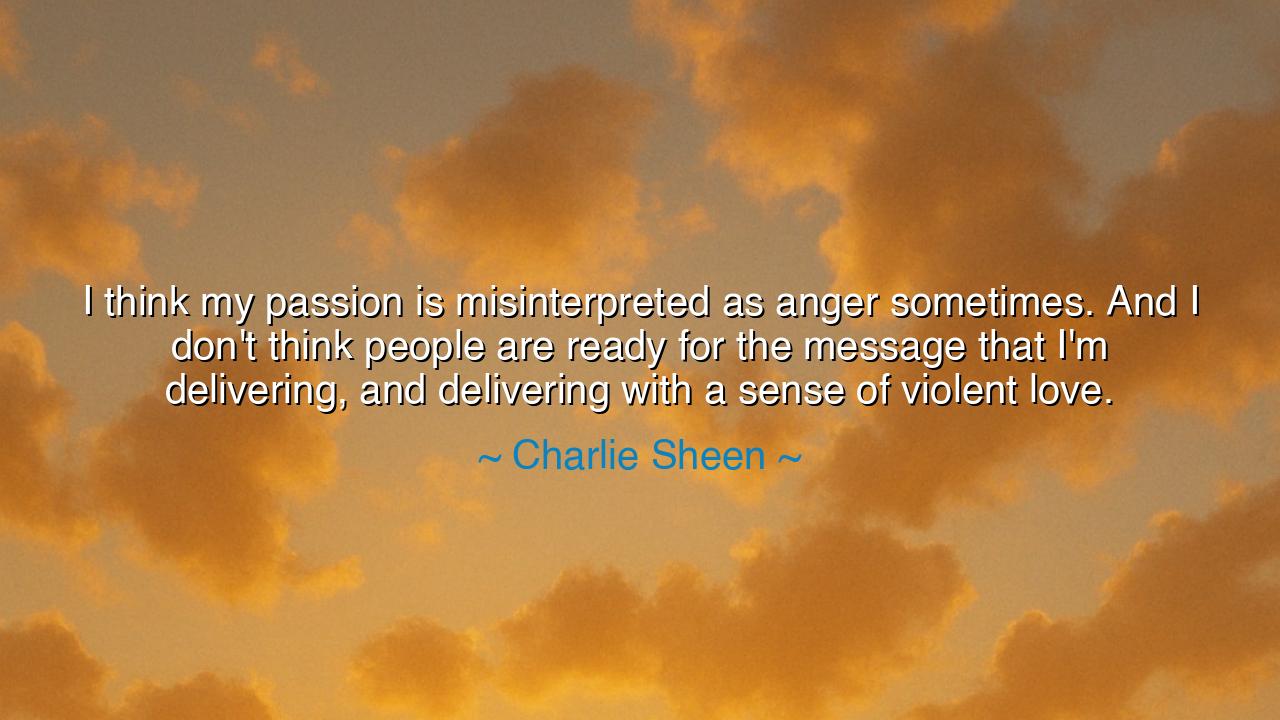
I think my passion is misinterpreted as anger sometimes. And I
I think my passion is misinterpreted as anger sometimes. And I don't think people are ready for the message that I'm delivering, and delivering with a sense of violent love.






Opening Scene
The soft glow of the evening light fills the room, creating a warm and inviting atmosphere. Jack and Jeeny sit at the kitchen table, their mugs of tea steaming gently between them. The world outside is quiet now, the city’s noise softened as the evening sets in. The gentle flicker of the lamp casts long shadows across the room, and the stillness invites deeper thought.
Host: The air is calm, yet there's a sense that the conversation is about to dive into something more complex. Jeeny looks up from her tea, her expression thoughtful, as she brings up a quote that has been on her mind.
Jeeny: (softly, her voice reflective) “I was thinking about something Charlie Sheen said recently. He said, ‘I think my passion is misinterpreted as anger sometimes. And I don’t think people are ready for the message that I’m delivering, and delivering with a sense of violent love.’ Isn’t that an interesting perspective? The way he describes his passion and how it can be misunderstood?”
Jack: (nodding slowly, his voice thoughtful) “It’s fascinating. Sheen’s words make you think about how passion, when it’s intense, can easily be mistaken for something negative like anger. And in his case, it sounds like he’s trying to deliver something important — but in a way that people aren’t ready to receive. He’s not saying anger drives him, he’s saying his message is misunderstood because of the intensity with which it’s delivered.”
Jeeny: (smiling softly, her voice gentle) “Exactly. I think a lot of people, when they see someone expressing themselves with strong emotion, they automatically assume it’s anger, when it might actually be passion, purpose, or even love in its most intense form. Sheen is describing the feeling of wanting to make a point, wanting to wake people up, but feeling like his method or delivery isn’t being fully understood.”
Host: The quiet in the room deepens, and the flickering of the candlelight seems to mirror the intensity of Sheen’s words. Jack takes a slow sip of his tea, clearly reflecting on the idea that passion and anger are often confused, especially when someone is speaking from a place of deep emotion. Jeeny watches him, sensing that something deeper is emerging in their discussion.
Jack: (his voice softer, almost reflective) “I think we’ve all experienced that — the frustration of expressing something with passion, only for it to be misinterpreted. It’s like the energy you’re putting out is so intense, people don’t know how to process it. They see the emotion, the strength, but they don’t always understand the intent behind it. Sheen’s ‘violent love’ seems like it’s not about destruction; it’s about the intensity with which he wants to express his truth, but it’s hard for others to see it that way.”
Jeeny: (nodding, her voice reassuring) “Yes, and that’s where the miscommunication happens. When someone expresses themselves with such power, others may see it as aggressive or destructive, when it’s actually just their way of trying to communicate something deeply important. Sheen’s words show how sometimes passion can be so overwhelming that people can’t see the underlying message of care or connection.”
Host: The stillness in the room feels more profound now, the conversation settling into something deeper. Jack and Jeeny sit together, understanding that emotion — especially passion — is a complex thing. The way we express our feelings, and the way those feelings are received, can often be misinterpreted, especially when the message behind the emotion is hard to understand.
Jack: (with a small, thoughtful smile, his voice calmer) “It’s interesting, isn’t it? How the same intensity that can drive someone to speak from a place of love and urgency can also be perceived as something else, something negative. And that’s the challenge of communication, isn’t it? Not just what we say, but how others interpret it.”
Jeeny: (smiling warmly, her voice gentle) “Exactly. And sometimes, it takes time for people to be ready for the message. For Sheen, his ‘violent love’ might be an attempt to shake people awake, to get them to see something they’re not seeing, but the way it’s expressed is hard for them to handle. It’s like he’s trying to deliver something profound, but the method is overwhelming.”
Host: The warmth in the room feels deeper now, as if the conversation has shifted into something more about understanding human emotion and communication. Jack and Jeeny sit in quiet realization that passion is often misunderstood because it is expressed with such intensity, and sometimes the real message — the intention behind the emotion — gets lost in translation.
Jack: (his voice gentler, almost with a sense of understanding) “It’s a reminder that intensity isn’t inherently bad. It’s how it’s received, how others interpret it, that changes the impact. Sheen’s ‘violent love’ could be the most genuine form of communication, but it’s up to others to understand it in that context.”
Jeeny: (nodding, her voice affirming) “Exactly. It’s about the balance between how we express our emotions and how others receive them. And sometimes, the most powerful messages come from a place that others aren’t quite ready to hear yet.”
Host: The evening continues, but the room feels richer now, filled with the quiet realization that the way we communicate, especially when it’s driven by deep passion, can be misunderstood. Jack and Jeeny sit together in the understanding that the intensity of emotion isn’t something to shy away from; it’s about finding a way to connect with others through that raw, authentic energy. Even when the message feels overwhelming, it still carries meaning — and it’s worth listening to.






AAdministratorAdministrator
Welcome, honored guests. Please leave a comment, we will respond soon